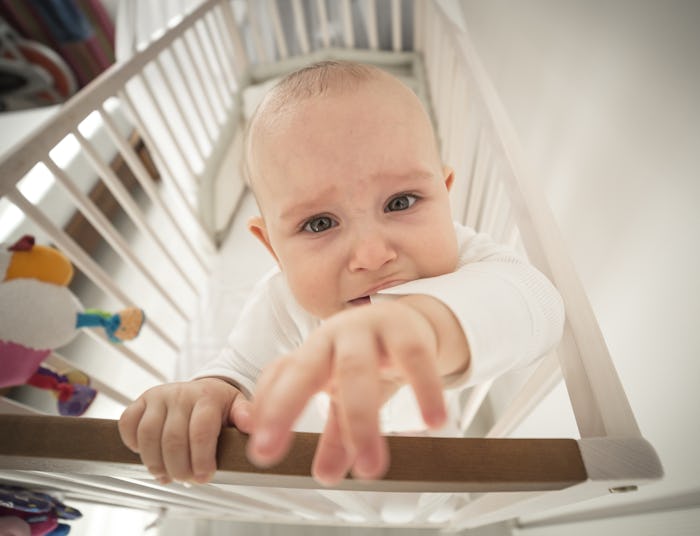Life
When To Expect Your Baby To Go Through Those Awful Sleep Regressions (Yes, That's Plural)
Moments before I started penning this article, I spent a few minutes googling "8 month sleep regression," because, you guessed it, my 8-month-old son no longer sleeps. It seems like I google that same topic every month, because there always seems to be something interrupting my baby's sleep. It may seem like sleep regressions happen every month, but they don't, thank goodness. So, when do sleep regressions happen? It's not as often as you think.
Sleep regressions don't happen every month, despite how tired new parents might feel, but they typically occur at 3-4 months, 8-10 months, 12 months, 18 months and 2 years, according to The Baby Sleep Site. And if that seems like all the time for the first two years, you are not alone.
If you're among the rested ones who haven't experienced a sleep regression yet, you'll know it when it happens. The Baby Sleep Site explained, "A sleep regression describes a period of time (anywhere from 1 – 4 weeks) when a baby or toddler who has been sleeping well suddenly starts waking at night, and/or skipping naps (or waking early from naps) for no apparent reason." Phooey. That means as many as five months of sleep regressions in your baby's first two years.
While baby sleep regressions might seem to be random, Wee Bee Dreaming suggested that most sleep regressions are simply a reflection of a changing sleep pattern for your baby: "Not at all coincidentally, we can see that all of these 'regressions' occur around the same time as nap transitions (the 4-3 nap transition around 4 months, the 3-2 nap transition around 9 months, and the 2-1 nap transition around 18 months)." The four month sleep regression also coincides with your baby phasing out of the typical newborn sleep schedule.
Additionally, baby sleep regressions can happen when your baby learns a new skill or trick like pulling up or rolling over, when they're teething, or when they're having a growth spurt. Wee Bee Dreaming continued to explain that rolling around four months can really wreak havoc on your baby's sleep because while they're no longer safe to swaddle, they might not like being swaddle-free. "The downside to this is that most babies at this age still have some, if not all, of their startle reflex (which is what we are trying to prevent with the swaddle). Simply unswaddling our babies and moving straight to a sleep sack will often cause baby to begin waking themselves up at night or start to have difficulty falling asleep/staying asleep for naps."
Luckily, some very smart people have started making different types of sleep sacks that help transition babies from swaddling to sleep sacks, helping to prevent sleep disturbances. If you're the parent of a soon-to-be four-month-old, you might consider a Merlin Sleep Suit ($40, Amazon) or the Swaddle Strap ($30, Amazon), both of which can help your baby sleep safely and soundly while they're transitioning out of the swaddle.
There are a few techniques you can use to overcome the dreaded sleep regressions. "Anticipate (and decrease) nighttime hunger, by encouraging daytime feeds," recommended Dr. Harvey Karp of The Happiest Baby On The Block books. You can also offer a dream feed around 11 p.m. or midnight. Karp also explained that getting your baby outside can help relieve some of the sleep regression symptoms, "Fresh air and sunlight exposure will help your little one recognize the difference between day and night."
Whatever you do, try to remain calm and remind yourself that the sleep regression will, at some point, end, and you and your baby will be able to get a little more sleep... that is, before the next sleep regression hits.
Check out Romper's new video series, Bearing The Motherload, where disagreeing parents from different sides of an issue sit down with a mediator and talk about how to support (and not judge) each other’s
